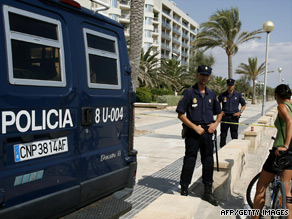(CNN) -- The separatist group behind a series of bombings on a Spanish vacation island marks the 50 year anniversary of its struggle this year, a milestone that sees it no closer to achieving its goal.

Police cordon off the route leading to the location of the latest blasts in Palma de Mallorca.
ETA, which is fighting for the independence of Spain's northern Basque region, was said to be behind three bombs that detonated on the island of Mallorca on Sunday without hurting anyone.
The latest incident appears to be part of a new wave of attacks, including another in Mallorca which killed two Civil Guard officers in July, which have left a 2006 cease-fire a distant memory.
The violent resurgence also defies Spanish government claims that the group's operational capabilities have been broken by a series of high profile arrests in Spain and France.
ETA, blamed for more than 800 deaths and listed as a terrorist group by Spain the European Union and the United States, began campaigning for Basque independence in 1959.
The group, whose full name Euskadi Ta Askatasuna means "Basque Homeland and Freedom" in the Basque language, killed what some say was its first victim in 1968.
Since then it waged a campaign of violence against the Spanish state, targeting politicians, policemen, judges and soldiers, often clocking up numerous civilian casualties with deadly car bombs.
In 1980 alone ETA was blamed for 118 deaths, and in 1995 it nearly succeeded in assassinating Jose Maria Aznar, then leader of the opposition and later Spain's prime minister.
On September 16, 1998, the organization declared a "unilateral and indefinite" cease-fire, raising hopes that its campaign was at an end. ETA called off the cease-fire in November 1999, however, and 2000 saw a sharp escalation in violence.
Another unilateral cease-fire was declared in March 2005, with ETA raising hopes for a lasting peace by declaring it "permanent." It was called off by ETA in June 2006 following numerous more ETA attacks.
At the center of the struggle is a region know as Euskal Herria in Basque. The area straddles the western end of the Pyrenees, covering 20,664 square kilometers in northern Spain and southern France. See map of territory claimed by Basque separatists
Spain officially recognizes three Basque provinces, Alava, Guipuzcoa and Vizcaya. A fourth neighboring province, Navarra, is of Basque heritage. Separatists consider these four provinces plus three in France -- Basse Navarre, Labourd and Soule -- as the Basque country, with a population approaching 3 million.
The area has always possessed a fiercely independent instinct. The Basque people are the oldest indigenous ethnic group in Europe and have lived uninterrupted in the same region since the beginning of recorded history.
Don't Miss
Their language, Euskera, which is spoken regularly by about 40 percent of Basque inhabitants, bears no relation to any other Indo-European tongue and dates back to before the Romans arrived in Spain.
For many centuries the Basques of Spain enjoyed a strong degree of autonomy.
The Basque region's hilly landscape helped keep its people isolated from outside influences.
In the Spanish Civil War, two Basque provinces -- Guipuzcoa and Viscaya -- fought against Gen. Francisco Franco, while the provinces of Alava and Navarra fought for Franco. Under Franco's dictatorship (1939-75), most of the Basque region had its remaining autonomy rescinded. Its culture, people and language were suppressed.
ETA and its demands for an independent Basque state arose in 1959 in the midst of this suppression.
ETA has focused its activities on the Spanish side of the border. For many years France provided a safe haven for ETA members, a situation that began to change in the mid-1980s.

The organization has financed its campaign through kidnapping, bank robbery and a so-called "revolutionary tax" on Basque businesses -- a payment widely regarded as plain extortion.
According to the counter-terrorism office of the U.S. State Department, ETA members received training in Libya, Lebanon and Nicaragua, while the group also enjoyed close links with the Irish Republican Army. The Good Friday peace accord influenced ETA to call its cease-fire in 1998.
All About Spain • ETA Separatist Group

 Sit tight, we're getting to the good stuff
Sit tight, we're getting to the good stuff